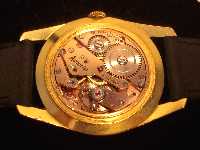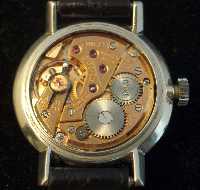Mechanical versus Quartz
 I often have conversations with people about my watch collection, and I invariably end up telling them that I prefer mechanical movements to quartz powered movements. Before I jump ahead of myself, I'd better explain what I mean. A movement is the "gubbins" inside a watch that make the hands turn. Traditionally they were mechanical which means that an intricate series of springs and cogs are used to drive the hands round. These used to be hand wound, by turning the crown to wind up a mainspring. Later on, automatic watches were developed which wound themselves by using a semi-circular rotor which span when your wrist moves to wind the mainspring (these were still mechanical movements though).
I often have conversations with people about my watch collection, and I invariably end up telling them that I prefer mechanical movements to quartz powered movements. Before I jump ahead of myself, I'd better explain what I mean. A movement is the "gubbins" inside a watch that make the hands turn. Traditionally they were mechanical which means that an intricate series of springs and cogs are used to drive the hands round. These used to be hand wound, by turning the crown to wind up a mainspring. Later on, automatic watches were developed which wound themselves by using a semi-circular rotor which span when your wrist moves to wind the mainspring (these were still mechanical movements though). Later on, as electronic devices became smaller and cheaper, the quartz watch was born. Quartz, the crystal favoured by hippies everywhere, is known to oscillate (vibrate) at a frequency relative to its shape when a voltage is applied (know as the piezoelectric effect). So, counting circuits are used to count the number of vibrations in a tiny piece of quartz which has been precisely shaped for a particular frequency (often, 32 KHz or 32,000 vibrations a second). Every 32,000 counts the second hand is moved on one more second.
Later on, as electronic devices became smaller and cheaper, the quartz watch was born. Quartz, the crystal favoured by hippies everywhere, is known to oscillate (vibrate) at a frequency relative to its shape when a voltage is applied (know as the piezoelectric effect). So, counting circuits are used to count the number of vibrations in a tiny piece of quartz which has been precisely shaped for a particular frequency (often, 32 KHz or 32,000 vibrations a second). Every 32,000 counts the second hand is moved on one more second. When I tell people I prefer mechanical watches, they often ask if that is because they more accurate. Unfortunately, that is not the case at all since generally even the best and most expensive mechanical watches will be out by 2-3 seconds per day (which to me is still a remarkable achievement) whereas a reasonable quartz watch can easily keep within 0.5 seconds a day. So for accuracy, quartz wins hands down. However, to me a mechanical watch is precision engineering at its very best. I have put some pictures of various mechanical movements I have sold over the years on this page to show how beautiful and incredible they can be. Knowing that the watch on my wrist is keeping time by using a spring together with precisely engineered cogs gives me a real sense of pride in my watch. This is even more true for mechanical watches with complications, such as chronographs, but I'll save that for another post (such as the upcoming introduction of my new Vulcain chronograph). Quartz watches are impressive in their own right, and I own several interesting examples, but for shear traditional engineering mechanical movements win hands down.
When I tell people I prefer mechanical watches, they often ask if that is because they more accurate. Unfortunately, that is not the case at all since generally even the best and most expensive mechanical watches will be out by 2-3 seconds per day (which to me is still a remarkable achievement) whereas a reasonable quartz watch can easily keep within 0.5 seconds a day. So for accuracy, quartz wins hands down. However, to me a mechanical watch is precision engineering at its very best. I have put some pictures of various mechanical movements I have sold over the years on this page to show how beautiful and incredible they can be. Knowing that the watch on my wrist is keeping time by using a spring together with precisely engineered cogs gives me a real sense of pride in my watch. This is even more true for mechanical watches with complications, such as chronographs, but I'll save that for another post (such as the upcoming introduction of my new Vulcain chronograph). Quartz watches are impressive in their own right, and I own several interesting examples, but for shear traditional engineering mechanical movements win hands down.For a far more in-depth comparison of quartz and mechanical watches, check out this Timezone article.

0 Comments:
Post a Comment
<< Home